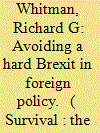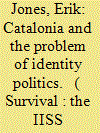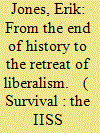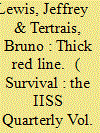|
|
|
Sort Order |
|
|
|
Items / Page
|
|
|
|
|
|
|
| Srl | Item |
| 1 |
ID:
156299


|
|
|
|
|
| Summary/Abstract |
The current public image of the Brexit process is of a British government negotiating with itself while simultaneously making little progress in Article 50 talks with the EU. It is perhaps inevitable that disputes over money, borders, citizens and a future trading relationship should overshadow other areas where the EU and UK could develop an effective post-Brexit partnership. Foreign, security and defence policy are areas where a departure from the existing intertwined relationship between the UK, the EU and the 27 other member states would have mutually detrimental effects.
|
|
|
|
|
|
|
|
|
|
|
|
|
|
|
|
| 2 |
ID:
156298


|
|
|
|
|
| Summary/Abstract |
The 1 October Catalan referendum on independence was a trap for Madrid. Spain’s political leaders were bound to be criticised whether they ignored the vote or tried to stop it. Shunting responsibility for dealing with the crisis onto the courts and the police was no way out. The voters in Catalonia know that. Now the Spanish government will be held to account. Political leaders everywhere should pay attention.
|
|
|
|
|
|
|
|
|
|
|
|
|
|
|
|
| 3 |
ID:
156303


|
|
|
|
|
| Summary/Abstract |
This summer, a nearly seven-year process to write the rules that should guide state activity in cyberspace came to a halt. Since 2010, the United States had successfully corralled the world’s main cyber powers at the United Nations to agree to a set of increasingly prescriptive norms of what they could and could not do in cyberspace. The process broke down over the United States’ desire to have states explicitly endorse the notion that the laws of war applied to cyber conflict.1 Russia, China, Cuba and others refused to do so, on the grounds that it would give a green light to hostile actions in cyberspace.
|
|
|
|
|
|
|
|
|
|
|
|
|
|
|
|
| 4 |
ID:
156301


|
|
|
|
|
| Summary/Abstract |
If the disagreements between Russia and the United States over compliance with the 1987 Treaty on Intermediate-Range Nuclear Forces (INF Treaty) cannot be resolved, there is a risk that it will be abandoned. While the agreement is of indefinite duration, the parties to it have the right to withdraw if they decide that extraordinary events related to its subject matter jeopardise key national interests. The notice period prior to withdrawal is only six months, so the treaty could be lost very quickly.1
|
|
|
|
|
|
|
|
|
|
|
|
|
|
|
|
| 5 |
ID:
156307


|
|
|
|
|
| Summary/Abstract |
When the Berlin Wall fell in November 1989, Edward Luce and his college friends drove to Berlin from Oxford to take part in the massive party that ushered in the end of communism. The communist world had been under strain at least since the imposition of martial law in Poland in 1981; the process accelerated rapidly when first Poland and then Hungary began to experiment with power-sharing arrangements. But the fall of the wall was the only event offering an excuse for a college-age kid to celebrate the sea change in history. Luce took advantage of the opportunity in the belief that a post-communist world would be much better than the one it replaced. His college tutors tolerantly accepted the reason for his absence upon his return.
|
|
|
|
|
|
|
|
|
|
|
|
|
|
|
|
| 6 |
ID:
156300


|
|
|
|
|
| Summary/Abstract |
It is reasonable to ask whether the Islamic State can survive as a non-territorial entity. The group, also known as ISIS or ISIL, has distinguished itself from other jihadi factions by virtue of its success in capturing and governing territory. ISIS claimed that its territorial strength (tamkin) showed it to be the legitimate Islamic state, promised by God in the Koran (24:55).
|
|
|
|
|
|
|
|
|
|
|
|
|
|
|
|
| 7 |
ID:
156304


|
|
|
|
|
| Summary/Abstract |
Conventional wisdom holds that China and Russia have managed to reach a tacit understanding over their respective roles in Central Asia. Some argue that, with Beijing effectively conceding to Russia the leading role in an emerging security architecture, the threat of a renewed Great Game in the region has been deferred.1 Others concur that, to many observers’ surprise, Central Asia’s independent states have not become objects of rivalry between Moscow and Beijing, but rather a major unifying element in Sino-Russian relations.2 The two governments, they underscore, cooperate more closely in Central Asia than in any other world region. A third group suggests that based on the evidence available thus far, Russia and China have upended predictions of greater competition and succeeded in transforming a potential source of tension into a means of greater cooperation and mutual reassurance.3 More recently, thanks to Russia’s involvement in the Syrian and Ukrainian conflicts, and internal economic woes caused by the imposition of Western sanctions and the decline in the price of oil, many leading observers believe Russia is neglecting its ‘soft underbelly’ – Central Asia – and losing ground in the region.
|
|
|
|
|
|
|
|
|
|
|
|
|
|
|
|
| 8 |
ID:
156302


|
|
|
|
|
| Summary/Abstract |
In summer 2013, the Syrian regime launched a large-scale chemical-weapons attack against its own people in the Damascus suburb of Ghouta, an event that left many people dead, disturbed France–US relations and reverberated around the world with potentially profound consequences for deterrence.
|
|
|
|
|
|
|
|
|
|
|
|
|
|
|
|
| 9 |
ID:
156297


|
|
|
|
|
| Summary/Abstract |
Prediction is a perilous endeavour in international politics; world events often make fools of those who claim to foresee them.1 It seems certain, though, that historians will someday view Donald Trump’s presidency as an inflection point in the trajectory of American grand strategy and the US-led international system. To be sure, ‘grand strategic’ may not be the first phrase that comes to mind regarding Trump, whose indiscipline and outbursts, unfamiliarity with key issues and unexpected changes of course have led many observers to conclude that his foreign policy lacks any structure whatsoever.2 Just under a year after Trump’s inauguration, however, it has already become clear that Trump’s presidency is freighted with grand-strategic significance.
|
|
|
|
|
|
|
|
|
|
|
|
|
|
|
|
| 10 |
ID:
156305


|
|
|
|
|
| Summary/Abstract |
Russia, Ukraine and the West may finally be groping for a way to dial down the violence in Ukraine’s eastern tip that has claimed more than 10,000 Ukrainian lives and generated some 1.5 million displaced persons in the past 46 months.1 If it succeeds, the modus vivendi will be messy, brought about by a convergence of Russian failure to reclaim Catherine the Great’s ‘Novorossiya’ from Ukraine, Moscow’s budget squeeze from economic stagnation and Western sanctions, the implausibility of any Ukrainian military reconquest of insurgent-held territory in the east and the restabilisation of the old Ukrainian oligarchy.
|
|
|
|
|
|
|
|
|
|
|
|
|
|
|
|
| 11 |
ID:
156306


|
|
|
|
|
| Summary/Abstract |
Sometime in the 1820s, the brilliant, decorated Mexican general Manuel de Mier y Terán wrote of his deep worry about the ‘unceasing’ arrival of new Anglo-American settlers in Texas. America, he lamented, was ‘the most avid nation in the world. The North Americans have conquered whatever territory adjoins them’ (p. 240). On 3 July 1832, dressed in his most elegant service garb, the 43-year-old Mexican patriot stabbed himself. Penned the night before, his despondent suicide note ended with the words ‘En qué parará Texas?’ – what will become of Texas?
|
|
|
|
|
|
|
|
|
|
|
|
|
|
|
|
|
|
|
|
|